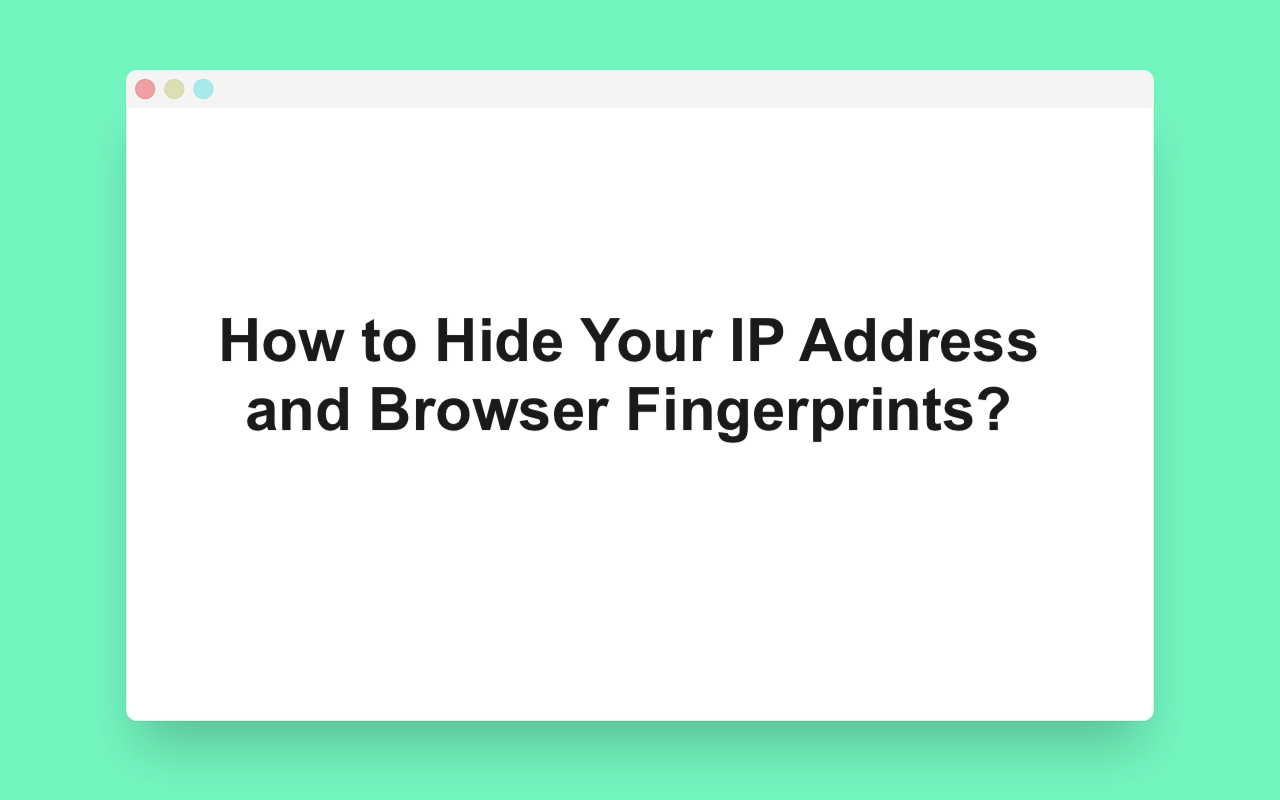
Have you ever been blocked from accessing your favorite website or had your account flagged for suspicious activity? It can be incredibly frustrating when you're just trying to go about your business, but your online presence is being tracked and exposed.
The truth is, your IP address and browser fingerprint can reveal a lot about you, and once they’re out there, they’re hard to hide. If you’re not careful, these identifiers can easily lead to your accounts being blocked or even targeted by malicious actors. But don’t worry, you’re not without options. In this article, let’s explore how you can protect your privacy, keep your online activities safe, and get the most out of the internet without worrying about detection.
The Hidden Dangers of Exposing Your IP and Fingerprint
Imagine you’re working on a project, maybe running a social media campaign or managing multiple e-commerce accounts, when suddenly—bam—your accounts are flagged or even banned. Why? It could be because your IP address is revealing your real-world location, or your browser fingerprint is being tracked across websites.
Your IP address is essentially your digital “home address”. Every time you visit a website, that address is exposed, allowing websites to track your location and activities. If you’re managing multiple accounts or doing something that raises flags (such as using automated tools), this can easily trigger bans or account restrictions.
But it doesn’t stop there. Your browser fingerprint—created from the information your browser sends out (like your operating system, screen size, and plugins)—is unique to you. Even if you change your IP address, your fingerprint can still be used to track and identify you across different sites. This is where the trouble starts, especially for businesses and individuals managing multiple online accounts.
The Solution: How to Protect Your Privacy
So, how can you protect your privacy and keep your activities anonymous? Thankfully, there are several methods available to hide your real IP address and browser fingerprint, and ensure that you can continue browsing safely and without detection.
1. Use a VPN
A VPN works by encrypting your internet traffic and routing it through a server located in a different region. This makes your real IP address appear as though it’s coming from that server’s location. Not only does a VPN hide your IP address, but it also secures your connection and ensures that no one is snooping on your online activities. It’s a simple yet effective way to regain some control over your digital privacy.
2. Proxy Servers
Another way to mask your IP address is by using proxy servers. When you use a proxy, your internet traffic is routed through another server, effectively masking your real IP address. However, proxies don’t always offer the same level of security as a VPN, and they can be less reliable. Still, they are a quick and easy solution for those looking to obscure their location.
3. Browser Fingerprint Masking
While VPNs and proxies can mask your IP address, browser fingerprinting protection requires a more specialized approach. Your browser sends out a unique combination of details about your device, which can be used to track your activity. Browser fingerprint masking tools work by altering or randomizing the information your browser sends out, so websites can’t identify you across different sessions. This adds an extra layer of privacy, particularly if you’re working with sensitive accounts or need to keep your online presence anonymous.
Antidetect Browser for Ultimate Privacy and Security
While VPNs, proxies, and fingerprint masking tools can help, antidetect browser such as DICloak takes privacy and security to an entirely new level. If you’re managing multiple accounts or engaging in business activities online, an antidetect browser offers a comprehensive solution that ensures your real IP and fingerprint remain hidden, without sacrificing performance.
Here’s how an antidetect browser helps you stay under the radar:
1. Customizable Browser Fingerprints
With an antidetect browser like DICloak, you can create unique browser profiles for each account you manage. Each profile comes with a custom fingerprint, ensuring that your activities are isolated from one another. This not only protects your privacy but also minimizes the risk of accounts being linked together, which is crucial if you’re managing multiple profiles for business or personal reasons.
2. Seamless Proxy Integration
Antidetect browser allows you to integrate various proxy protocols (HTTP/HTTPS, SOCKS5) with each browser profile. You can easily configure proxies in bulk, giving you more control over your online presence. No more worrying about your real IP address being exposed—DICloak ensures that each account is assigned its own unique proxy, hiding your location and protecting your identity.
3. Advanced Security Features
Each browser profile is isolated, ensuring that your online activities remain secure. With its advanced security configurations, antidetect browser prevents the leak of any identifying data, keeping your operations safe from prying eyes.
Conclusion: Take Control of Your Digital Privacy
Protecting your IP address and browser fingerprint is no longer a luxury—it’s a necessity in today’s digital world. Whether you’re simply browsing for personal use or managing multiple accounts for business, exposing your real identity can lead to significant risks, including account bans and online targeting.
By using tools like VPNs and proxies, you can hide your IP address, but if you want a truly comprehensive solution that combines fingerprint masking, proxy integration, and advanced security, an antidetect browser such as DICloak is the ultimate choice.
Share this post
Leave a comment
All comments are moderated. Spammy and bot submitted comments are deleted. Please submit the comments that are helpful to others, and we'll approve your comments. A comment that includes outbound link will only be approved if the content is relevant to the topic, and has some value to our readers.

Comments (0)
No comment